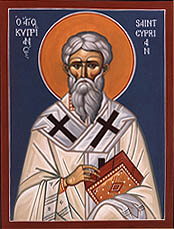|
Thursday, September 16, 2004
|
St. Cyprian and the Sad Legacy of Sanctity
 Today the Church celebrates the memorial of St. Cyprian of Carthage. This saint probably has very different connotations for me than anyone else, being as I spend most of my life between the pages of an Augustinian Vitae. To me, the name of Cyprian brings to mind two things - schism and heresy. Not, of course, that St. Cyprian could ever be considered guilty of either charge; no one plead more urgently than he for the unity of the Church, or defended her faith more valiantly. These charges belong, however, to those who unlawfully seized upon St. Cyprian's legacy after his untimely death. I'm speaking, of course, of the Donatists, those abrasive African secessionists, who touted the works of Cyprian and fought in his name. In the late fourth-century Africa into which Augustine was born, the name of Cyprian practically verberated with ideological and national potency. Think of Our Lady of Guadalupe for nineteenth-century Mexicans. This famed martyr-bishop left in his wake not only a reputation for sanctity, but a rallying cry for the unstained purity of the Catholic Church to shine forth against the filthy backdrop of the aging world. For the Donatists, this meant a brutal intolerance for relapsed sinners, an utter disdain for any cooperation with secular governance, and a skewed and moralistic outlook on sacramental grace.
Appointed bishop in a milieu where the legacy of Africa's greatest saint had been coopted for the cause of schism and heresy, St. Augustine could hardly sit idly by. The former half of his career as bishop was devoted to rescuing St. Cyprian's legacy, restoring it to its place in the fold of Catholic unity. Book II of his De baptismo, for example, is dedicated wholly to this subject. St. Cyprian, as St. Augustine proves, if could live to see this day, could never sanction the schismatic dissension of the Donatist party; on the contrary, he devoted his life to the unity of the Church, and was never ashamed to 'brush shoulders with sinners,' so long as all could repose in this same unity.
This got me thinking. The legacies of many of our great saints have fallen prey to misuse, being taken up as battle standards for causes the saints would have shunned with all their might. Origen of Alexandria spawned the Isochristoi, St. Cyril the Monophysites. St. Augustine had his Gottschalk and St. Pius X has, well, his Society. Even St. Augustine was not immune to the tendency. In fact, he had the privilege (or rather, the misfortune) of facing it in his own lifetime. The archenemy of his later years, Pelagius the Briton, had scurried across the European continent touting Augustine's early anti-Manichaean works (namely, On Free Will) as defense for his brand of theological humanism, before their author set himself to devoting the latter half of his career as bishop to refute the error his own works had helped to nourish.
# posted by Jamie : 9:47 AM
|
|

